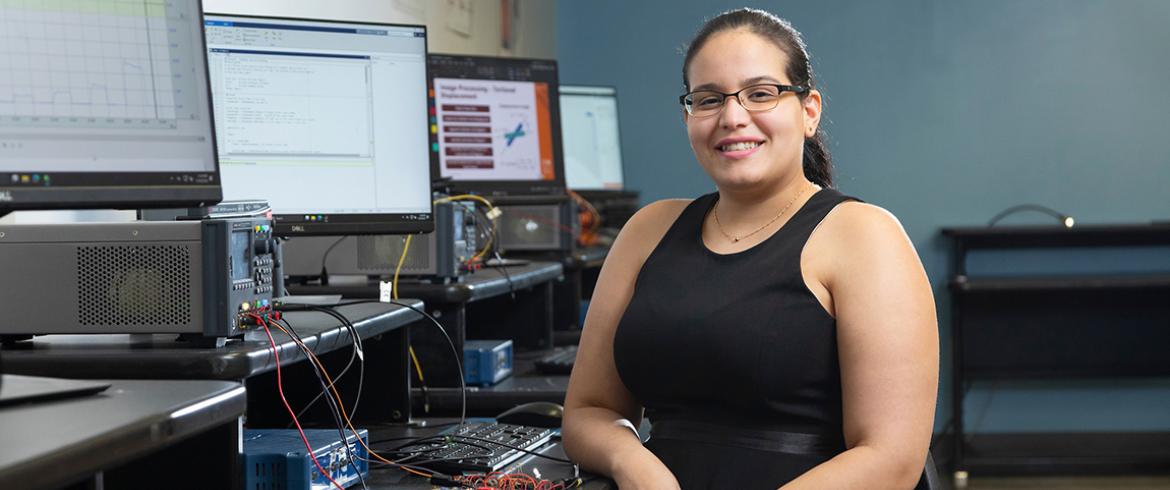
Vivian Bernard’s biomedical engineering undergraduate experience was infused with a desire to help others and to learn more about the broader region through the Gulf Scholars Program. (Scott Holstein/FAMU-FSU College of Engineering)
Vivian Bernard, a recent biomedical engineering graduate from the FAMU-FSU College of Engineering is just beginning her journey toward changing the world.
Born in the Dominican Republic and raised in Florida, she wants to use engineering to help people in the best way she can.
“The main reason I wanted to be an engineer was to help people,” Bernard explained. “Growing up I knew how lucky I was, especially when comparing my life to those back in the Dominican Republic. I had opportunities and chances that people there could only dream of, so I’ve always wanted to do something that would allow me to give back and help others.”
One way Bernard has helped people is through the college’s Gulf Scholars Program. Student participants earn their degrees while doing meaningful work in communities in the Gulf of Mexico region of the United States.

“One thing I learned in the program is that to make a difference you don’t need to do anything big,” Bernard said. “By simply investing your time into a project, you will help others—and that makes a difference.”
Just before graduation in Spring 2024, Bernard shared her thoughts on engineering and impacting the world.
How do you see yourself making an impact in the future?
I dream of saving enough money to open a STEM school in the Dominican Republic. I want it to have plenty of lab space, a library, computers and an engineering workshop. It should be free to attend because most schools in the D.R. require parents to pay tuition, which isn’t an option for all families.
I want to inspire the next generation of students and nurture their love of learning about new things. I want to give them a hands-on experience they would only have if they were fortunate enough to attend college.
Why engineering?
Since high school, my skills have aligned with those of an engineer. I look at things analytically and I fell in love with science in middle and high school. My teachers inspired me to choose engineering. Ironically, almost all my science teachers in high school were engineers. My biology teacher was the only one who wasn’t; initially, she was a pre-med major who decided to change paths to inspire students. Before I met them, becoming an engineer had never crossed my mind.
How has the Gulf Scholars Program shaped your educational experience?
The Gulf Scholars Program added much value to my life because it allowed me to be in places and situations I would have never gotten to otherwise. It got us out of the classroom and talking to people. For example, we went to the FSU Marine Lab to talk about the Gulf’s oyster population and also to the Providence Community Garden near the college.
The program responds to student feedback. After going to Houston for the national conference, I told them I wanted to look at the labs and learn about the research at Rice. That led to a private tour with the researchers and a one-on-one conversation with the Vice Provost of Academic Affairs, who gave me academic and career advice. His words were impactful and gave me a new perspective on graduating.
What is your latest activity with the group?
I led a team of students from different universities, including LSU and Tulane, and did a deep dive to discover exciting facts about each school. Ultimately, we hosted a massive networking session at the Gulf Scholars Conference in Houston. At the event, we got some friendly rivalry going and had students talking to each other. I had to devise ways for them to network and find common ground.
Tell us about your biomedical research.
I worked as a research assistant under Professor Liang at the High-Performance Materials Institute and was involved in an Air Force project. My work focused on making composites and mechanically characterizing materials. I also worked on another research project with Professor Liu as an Honors in the Major candidate. My research with him focused on developing a software package that combines image processing and physics-informed neural networks to extract kinematic information from images and videos of fluid flow.
You’re now looking back at the joint college as an alumna. What do you remember most about your experience here?
The people. It doesn’t matter if it was the professors from my department or the friends I’ve made in the process; I feel like the time I spent with them will have a lasting impact. I’ve met many great engineering professors and mentors who have wanted to help me. They have given me nothing but support and have wished for my success. I know looking forward, I will never forget them. I am thankful for everything they did for me. I’ve also gotten a chance to make lifelong friends I hope to keep in my life forever.
What’s next after graduation?
Recently, I received and accepted a job offer from AbbVie as Associate Scientist I, Analytical Development, which is part of their Operations Scientist Development Program. I may come back and get my Ph.D., and I am interested in becoming a professor. I love to learn new things and love to help people, and being a professor would allow me to combine my two passions.
RELATED ARTICLES
FSU, FAMU researchers receive National Academy of Sciences grant to form new Gulf Scholars Program
Focus on the Gulf Event Tackles Big Challenges in the Gulf Region
Caring About the Environment Is This Grad Student’s Way of Giving Back
